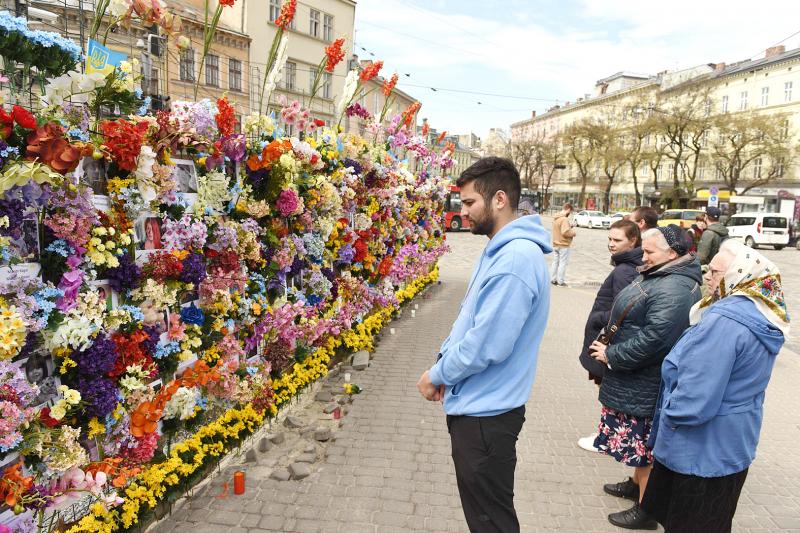In western Ukraine, Tetiana Kasian stopped on the pavement to take in a wall of flowers that had gone up overnight in memory of those killed since Russia’s invasion.
Scanning the bright burst of artificial petals, the 32-year-old found the smiling faces of men, women and children, including some people she knew.
“It’s devastating,” she said. “I never thought that it would happen in Ukraine in the 21st century.”

Photo: AFP
Kasian explained that she was originally from the southern port city of Mariupol, now almost entirely under Russian control.
“I don’t know if I will see my parents” again, she said quietly.
The war has killed thousands of people since Russia invaded on Feb. 24, including at least 2,224 civilians, according to the UN.
The laminated photographs displayed in central Lviv represent just a tiny fraction of them.
Among them is 11-year-old gymnast Kateryna Diachenko grinning in a leotard, before she was killed at home in Mariupol by a Russian missile.
There is army paramedic Valentina Pushich, who lost her life trying to help evacuate civilians near the capital, and Indian student Naveen Gyanagoudar, who died in the eastern city of Kharkiv on his way to buy food.
After mass on Orthodox Easter Sunday, dozens paused in front of the memorial.
A pink scarf tied around her hair, an elderly lady carefully examined several pictures and each name below.
Leo Soto, an American born in Venezuela, traveled all the way from Florida to put up the floral tribute.
“It’s a wall of hope,” the 27-year-old hospitality school student said.
Soto said that he had made his first memorial in Miami after a building collapsed there last year, killing 98 people including a high-school classmate.
People responded well, and he now wanted to provide what little comfort he could to Ukrainians.
In his latest wall of flowers in Lviv, he chose artificial flowers — all donated in Poland — so people would not have to replace them and it would be more permanent.
The response has been overwhelming, he said.
As he and bystanders attached the stems with plastic ties on Saturday, a soldier in uniform approached him to ask if he could add a picture of his late brother.
Soto saw a funeral procession pass by, a mother in floods of tears behind the coffin draped in the national flag.
“It’s every day, it’s reality,” he said.

FRAUD ALLEGED: The leader of an opposition alliance made allegations of electoral irregularities and called for a protest in Tirana as European leaders are to meet Albanian Prime Minister Edi Rama’s Socialist Party scored a large victory in parliamentary elections, securing him his fourth term, official results showed late on Tuesday. The Socialist Party won 52.1 percent of the vote on Sunday compared with 34.2 percent for an alliance of opposition parties led by his main rival Sali Berisha, according to results released by the Albanian Central Election Commission. Diaspora votes have yet to be counted, but according to initial results, Rama was also leading there. According to projections, the Socialist Party could have more lawmakers than in 2021 elections. At the time, it won 74 seats in the

A Croatian town has come up with a novel solution to solve the issue of working parents when there are no public childcare spaces available: pay grandparents to do it. Samobor, near the capital, Zagreb, has become the first in the country to run a “Grandmother-Grandfather Service,” which pays 360 euros (US$400) a month per child. The scheme allows grandparents to top up their pension, but the authorities also hope it will boost family ties and tackle social isolation as the population ages. “The benefits are multiple,” Samobor Mayor Petra Skrobot told reporters. “Pensions are rather low and for parents it is sometimes

BACKLASH: The National Party quit its decades-long partnership with the Liberal Party after their election loss to center-left Labor, which won a historic third term Australia’s National Party has split from its conservative coalition partner of more than 60 years, the Liberal Party, citing policy differences over renewable energy and after a resounding loss at a national election this month. “Its time to have a break,” Nationals leader David Littleproud told reporters yesterday. The split shows the pressure on Australia’s conservative parties after Prime Minister Anthony Albanese’s center-left Labor party won a historic second term in the May 3 election, powered by a voter backlash against US President Donald Trump’s policies. Under the long-standing partnership in state and federal politics, the Liberal and National coalition had shared power

CONTROVERSY: During the performance of Israel’s entrant Yuval Raphael’s song ‘New Day Will Rise,’ loud whistles were heard and two people tried to get on stage Austria’s JJ yesterday won the Eurovision Song Contest, with his operatic song Wasted Love triumphing at the world’s biggest live music television event. After votes from national juries around Europe and viewers from across the continent and beyond, JJ gave Austria its first victory since bearded drag performer Conchita Wurst’s 2014 triumph. After the nail-biting drama as the votes were revealed running into yesterday morning, Austria finished with 436 points, ahead of Israel — whose participation drew protests — on 357 and Estonia on 356. “Thank you to you, Europe, for making my dreams come true,” 24-year-old countertenor JJ, whose